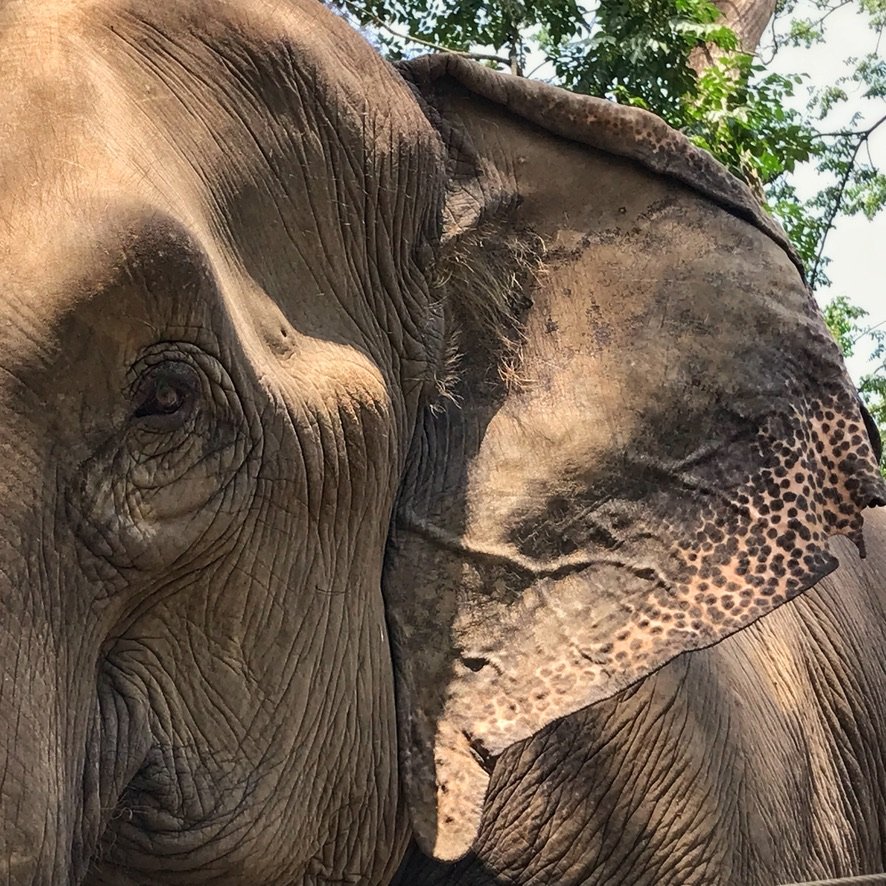Elephants, revered symbols of wisdom and strength in Asian cultures, have long been a draw for tourists seeking memorable wildlife encounters. However, the way we interact with these majestic creatures have had profound implications in their wellbeing and conservation. Responsible elephant tourism is not just a buzzword—it's a commitment to ethical practices that prioritize the welfare of elephants and support sustainable tourism initiatives across Asia. This includes their handlers and communities too.
Why Choose Responsible Elephant Tourism?
Make sure that the elephants you interact with are not chained and don’t show signs of physical abuse. If you do, make sure to take a photo, say something to their handlers and share a review. Photo taken during one of my trips to Chitwan, Nepal. © The Elephant Soul
1.Ethical Sanctuaries and Rescue Centers: When planning your elephant experience, choose reputable sanctuaries and rescue centers that prioritize elephant welfare. These facilities offer natural habitats, proper nutrition, and medical care without compromising the elephants' well-being. They usually also avoid direct contact and touching the elephants.
2. No Riding, Only Observing: Riding elephants, a common practice in some regions, can cause physical harm and distress to these gentle giants. Instead, choose to observe elephants in their natural habitats, allowing them to roam freely and exhibit their natural behaviors. No bathing, riding, touching the elephants are allowed.
3. Supporting Conservation Efforts: By participating in responsible elephant tourism, you directly contribute to conservation efforts aimed at protecting elephant habitats and promoting sustainable practices. Your support helps fund enrichment of rescued elephants, community education programs and habitat restoration.
4. Educational Opportunities: Responsible tourism provides valuable educational opportunities for travelers. Learn about elephants' natural behaviors, conservation challenges, and the importance of preserving their habitats for future generations. I highly recommend spending a week volunteering at the Elephant Nature Park in Chiang Mai, Thailand.
Choosing a responsible venue to interact with elephants is crucial to their emotional and physical wellbeing. Image: Working elephant in Chitwan, Nepal. Photo taken during one of my trips to Nepal. © The Elephant Soul
How to Find Ethical Elephant Experiences
1. Read the Reviews: Before booking any elephant-related activity, research the facility thoroughly. Look for reviews and recommendations from reputable sources that emphasize ethical treatment and conservation efforts. If you see photos of elephants being ridden or chained, avoid going altogether.
2. Educate Yourself: Learn about elephants' natural behaviors and needs. Understanding their social structures and environmental requirements will help you appreciate them more deeply and advocate for their welfare. Organizations like World Animal Protection (WAP) has an excellent elephant friendly tourist guide with recommended venues.
3. Support the Local Community: Choose experiences that involve and benefit local communities. Responsible tourism should support livelihoods and encourage sustainable development while respecting cultural traditions. It is also an economic incentive for them to keep doing good work for elephants.
Making a Difference Through Responsible Choices
Look for sanctuaries and rescue centers that prioritize elephant welfare. These places provide natural habitats, proper diet, and medical care while allowing elephants to roam freely. Photo taken during one of my trips to Chitwan, Nepal. © The Elephant Soul
Responsible elephant tourism in Asia is about making informed choices that prioritize animal welfare and sustainable tourism practices. By supporting ethical sanctuaries, refusing to ride elephants, and engaging with educational programs, you contribute to the protection and conservation of these incredible creatures.
Conclusion: Embracing Responsible Tourism
In conclusion, responsible elephant tourism is an opportunity to engage with nature respectfully and support conservation efforts in Asia. By choosing ethical practices and spreading awareness, we ensure that elephants continue to roam the forests of Asia for future generations to admire and cherish.
Make your next travel experience meaningful by choosing responsible elephant tourism. Together, we can make a positive impact on elephant conservation and promote sustainable tourism practices across Asia.
If you would like to know more about what to look for when choosing an ethical venue on your next trip to Asia, feel free to email me and I’ll share a list of resources.
Namaste.




